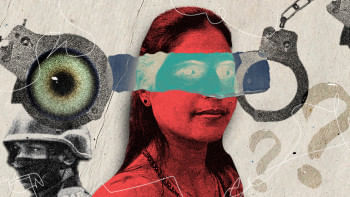State should investigate all deaths in custody

On March 22, Sultana Jasmine, 38, a single mother, was picked up by the Rapid Action Battalion (Rab) at around 10am while she was on her way to the Chandipur Union Land Office, where she worked as an office assistant. Some 48 hours later, on March 24, she was declared dead at the Rajshahi Medical College Hospital (RMCH).
In her death certificate, the cause of death has been stated as "irreversible cardio-respiratory failure due to intra-cerebral haemorrhage". Reportedly, she had suffered a head injury along with brain haemorrhages. But what caused it remains a mystery.
Sultana was initially admitted to the Naogaon hospital at 1:15pm on March 22, which means she was taken there within a few short hours of her detention. According to Rab, soon after her arrest, Sultana had fallen sick and was rushed there. As for her head injury, Rab said she had fallen down.
Sultana's relatives, however, claimed that she was a perfectly healthy individual and alleged that Rab must have tortured her in custody. The reasons why people might be inclined to share their suspicions over the claims made by Rab are plenty. Number one among them is the frequency with which individuals in custody of our law enforcement agencies suddenly fall ill or succumb to "fatal" accidents or injuries. Even if we are to believe these claims of freak "accidents", mustn't we ask why our law enforcement agencies handle detainees so poorly? And shouldn't the law enforcers be held responsible for being so careless?
What is also interesting is that Rab recorded a case against her under the Digital Security Act (DSA) – for "syphoning off" money from job seekers using a Facebook account – more than 31 hours after she had been picked up and when she was unresponsive in a hospital bed. Without first recording the case, what justification did Rab have for detaining her? According to rights bodies, after Sultana was detained in a case, she was illegally interrogated and police were not informed. These are the worst examples of violation of the constitution, fundamentals of human rights, Supreme Court directives, existing laws, and misuse of power, the Human Rights Forum Bangladesh (HRFB) said in a statement.
Exactly a week before Sultana's death, on March 17, a 65-year-old man was shot dead and another was shot in the legs during a raid by Rab in a village of Sonargaon upazila of Narayanganj. According to a Rab commanding officer, law enforcers opened fire "in self-defence" after miscreants opened fire on them and tried to snatch a murder suspect from them. Multiple witnesses, however, have said that the deceased and others present at the scene were unarmed. They also said the law enforcers were wearing plainclothes – in violation of a High Court ruling – and opened fire when villagers, who were unaware of the presence of Rab and thought some crime was taking place, came out to figure out what was going on.
In the absence of independent investigations, the domestic and international perceptions that our law enforcing agencies are involved in widespread human rights violations will continue to persist, further tarnishing the image of the country. So why are our government high-ups, who claim to be so concerned about preserving Bangladesh's image on the world stage, least concerned about it?
Once again, Rab's version of the story is completely contradictory to what numerous eye witnesses have claimed. And so far, we have heard nothing about there being an independent investigation to find out why an innocent old man, who had nothing to do with the case that brought Rab to that location, had to die.
Back in 2019, the United Nations Committee against Torture (CAT), upon receiving the government's overdue and lacklustre initial State Report under Article 19 of the United Nations Convention against Torture and other Cruel, Inhuman or Degrading Treatment or Punishment (UNCAT), said that it was "concerned at information it received alleging the widespread and routine commission of torture and ill-treatment… by law enforcement officials for the purpose of obtaining confessions" in Bangladesh. These allegations included 1,335 people being extrajudicially killed by law enforcing agencies through crossfire between January 2014 and May 2019 and the alleged deaths of 348 prisoners in jail custody during that time, among other human rights violations recorded by local and international rights organisations, UN agencies and others.
Similarly, in its 2015 annual report, the National Human Rights Commission of Bangladesh reported that 70 percent of the complaints it received "alleged a human rights violation by law enforcement agencies and about half of all complaints concerned torture allegations." In spite of that, the CAT was provided information by the Bangladeshi delegation about the filing of only 17 cases under the Anti-Torture Act against members of the law enforcing agencies, which shows the lack of willingness on part of the government to investigate – let alone hold to account – law enforcers alleged to have been involved in some of the worst human rights violations.
In the absence of independent investigations, the domestic and international perceptions that our law enforcing agencies are involved in widespread human rights violations will continue to persist, further tarnishing the image of the country. So why are our government high-ups, who claim to be so concerned about preserving Bangladesh's image on the world stage, least concerned about it? Is it so that they can use the same law enforcing agencies and the same tactics to silence any dissent against the government? Is it so that they can use the law enforcing agencies to illegally suppress opposition political parties, as alleged by multiple international rights organisations?
The government would be well-advised to keep in mind that our security forces are under increased scrutiny following the designation of human rights sanctions by the US government and in the lead-up to general elections slated for early 2024. Therefore, by continuing to provide such leeway to alleged human rights violators from within our security forces, it risks further criticism and actions against our country from the international community.
More importantly, a sense of injustice being perpetrated against them by state actors is increasingly building up among the common people. And it might only be a matter of time before they consider this injustice to be too much to bear, which certainly raises risks of social disharmony and dissatisfaction among the population.
Eresh Omar Jamal is assistant editor at The Daily Star. His Twitter handle is: @EreshOmarJamal

 For all latest news, follow The Daily Star's Google News channel.
For all latest news, follow The Daily Star's Google News channel. 










Comments